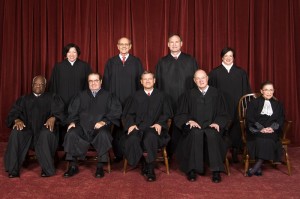NAACP
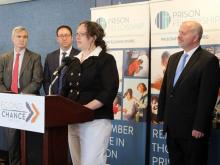
A national prison ministry is joining forces with conservative and liberal groups to call on church leaders and politicians to give former prisoners a second chance at normal lives.
“We believe people with a past can rise from their failure, repay their debt, and restore and heal our communities that are affected by crime,” said Craig DeRoche, senior vice president of Prison Fellowship, as he launched the first “Second Chance Month.”

Anti-Semitic incidents have been rising in the U.S. in the past few years, and many Jews and others fault the Trump administration for only belatedly calling out anti-Semitism, and for failing to explicitly denounce those who have heralded his election as a victory for white people.
And Jewish and Muslim groups have banded together in unprecedented ways, in recent months, as mosques and Jewish institutions have been targeted.

As many as four white students were accused of putting a noose around the neck of a black student during football practice at Stone High School in Wiggins, Miss., earlier this month. The President of the Mississippi NAACP is now demanding a federal probe to investigate the matter.
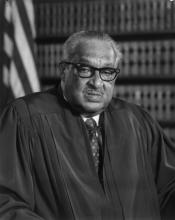
On Aug. 30, 1967, Thurgood Marshall was confirmed by the United States Senate as the first African-American Supreme Court Justice. Throughout his tenure as an Associate Justice of the Supreme Court, and even prior to his nomination to the court by President Johnson, Marshall left his mark on various cases that have proved pivotal to pushing America closer toward being a fair and just society for all.
Here are five Supreme Court cases in which Marshall fought for justice—often while he was on the other side of the bench—and won.
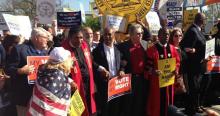
Today is the first time I have ever been arrested in Washington, D.C. I came for the same reason Southern political leaders petitioned President Grant to send troops in the 1870s — for the same reason Dr. King called upon Presidents Kennedy and Johnson to enforce federal law in the 1960s. I came because the interposition and nullification of extremists is blocking a Third Reconstruction in America today.
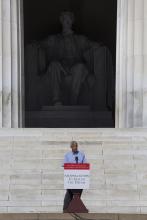
Julian Bond, prominent civil rights activist in the 1960s and later chairman of the N.A.A.C.P., died Saturday night at the age of 75, The New York Times reports.
Mr. Bond embodied many roles in his life, including "writer, poet, television commentator, lecturer and college teacher," and remained a prominent spokesperson for justice causes — including as part of the Fast for Families for immigration reform, alongside Sojourners — until his death.
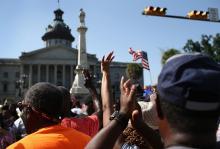
When the Confederate flag was removed from the South Carolina statehouse Friday morning, Gov. Nikki Haley spoke solemnly of the nine black churchgoers who were shot to death less than a month ago at Charleston’s Emanuel African Methodist Episcopal Church.
“We have all been struck by what was a tragedy we didn't think we would ever encounter,” Haley said of the horrifying massacre before she signed the bill with nine pens that will go to the families of the victims. “Nine amazing people that forever changed South Carolina's history."
Haley also referenced the “grace” shown by the nine families when they forgave the white gunman. She said their grace helped usher the state toward this long overdue decision. The assassinations at Emanuel AME, followed by forgiveness from the grieving families, were similarly cited by several South Carolina lawmakers as their reason for voting to remove the flag. Black Deaths Matter. That’s the painful and dangerous narrative being developed out of South Carolina. Only Black Deaths Matter. Our nation is capable of doing the right thing – such as taking down the Confederate flag in the year 2015, a flag that represents the racist, immoral, unconstitutional defense of slavery and Jim Crow – but only when black deaths happen and are met by a response deemed acceptable. Ever since this flag was raised in 1961 to send the message that South Carolina would not honor equal protection under the law, tens of thousands of small and large protests have not been enough to move the power brokers to take it down.

The real war on terror is not a war on Western values or American values. It is evil perpetuating crimes of power and control, and its costs are measured in real in human lives. Those lives are largely black and brown, and the focus on the danger to America with its resulting protectionism and cultural-centrism is endangering lives long term.
Church, let us not join in the narrative of self-preservation. Let us not value those who look and think like our own community more than those who are culturally different. Let us not value the wealthy more than the impoverished. Let justice-speech ring from our pulpits, and let love for the culturally different be reflected in our prayers and our financial endeavors. For the world to hear that in Christ all lives matter, we the Body must speak loudly and demonstrate that #blacklivesmatter #brownlivesmatter.
A makeshift bomb placed outside a local chapter of the NAACP in Colorado went off yesterday, releasing smoke but failing to ignite a gasoline can placed beside it, Newsweek reports. There were no injuries.
The FBI has declared the bombing "deliberate," but is still investigating whether the NAACP was the intended target. The building's other tenant, a hair salon, does not appear to have been the target.
The media's slow-to-silent response to the incident has raised ire on Twitter, with many concerned that the bombing did not make news on mainstream outlets until today.
"Thankfully, no injuries were reported, but the fear it struck in the local community and in citizens concerned for issues of racial justice everywhere were felt immediately ... In a time when racial tensions in our country appear to be growing, the troubling nature of this act of domestic terrorism should be blatantly obvious, but the lack of mainstream media coverage of the bombing ... was downright disturbing," wrote Shaun King, staff writer for the Daily Kos.
According to Newsweek, the FBI has asked that anyone with information call its Denver tip line at 303-435-7787.

Living God's Reign
In Witnessing: Prophecy, Politics, and Wisdom, edited by Maria Clara Bingemer and Peter Casarella, international scholars write on many aspects of Christian witness, including martyrdom (especially Catholic martyrs in El Salvador), personal narrative, the interlocking realities of God’s beauty and justice, and intercultural dialogue. Orbis
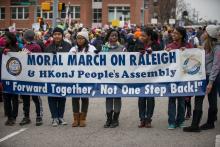
I believe that deep within our being is a longing for a moral compass. For those of us who are moved by the cries of our sisters and brothers, we know that, like justice, the acts of caring for the vulnerable, embracing the stranger, healing the sick, protecting workers, welcoming and being fair to all members of the human family, and educating all children should never be relegated to the margins of our social consciousness. These are not just policy issues; these are not issues for some left vs. right debate; these are the centerpieces of our deepest traditions of our faiths, of our values, of our sense of morality and righteousness.
We must remind those who make decisions regarding public policy what the prophet Isaiah said "Woe unto those who legislate evil ... Rob the poor of their rights ... make children and women their prey." Isaiah 10: 1-2
Martin Luther King, Jr. said 46 years ago in one of his last sermons that if you ignore the poor, one day the whole system will collapse and implode. The costs are too high if we don’t address systemic racism and poverty. It costs us our soul as a nation. Every time we fail to educate a child on the front side of life, it costs us on the back side — financially and morally.
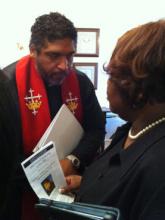
North Carolina’s weekly protests against Republican-backed legislative initiatives last year brought thousands of people to the state Capitol in Raleigh each Monday chanting, “Forward together, not one step back.”
Now the movement is ready to reprise its demonstrations, which recall the tactics of the civil rights era.
The Rev. William J. Barber II and his Moral Mondays team are making final preparations for the kickoff event, dubbed the Moral March, scheduled for Saturday. Barber hopes it will be bigger than the Selma march for voting rights in 1965 that drew 25,000 people.
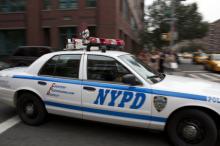
A coalition of 125 religious, civil rights, and community-based organizations sent a letter to the U.S. Department of Justice Thursday urging a civil rights investigation into a New York City Police Department program that spies on Muslims.
Groups from several faith traditions signed the letter including the Presbyterian Church (USA), the National Council of Jewish Women, the Hindu American Foundation, and the Sikh Coalition. Civil rights groups include the Leadership Conference on Civil and Human Rights, the NAACP, the American Civil Liberties Union, South Asian Americans Leading Together, and the National Network for Arab American Communities.
The NYPD program is already the target of two federal lawsuits, one filed in June by the ACLU and the City University of New York Law School’s Center for Law Enforcement Accountability and Responsibility, and the other filed in June 2012, by several Muslim plaintiffs represented by Muslim Advocates and the law firm Bhalla and Cho.

THOSE WHO BELIEVE in freedom and work for justice in our world sometimes grow nostalgic about the 1960s in this country, looking back at the leadership that emerged from African-American churches in the South, drawing allies from outside the region and beyond the bounds of creed. America has a vivid, living memory of faith inspiring public justice. But the civil rights movement did not just happen. The March on Washington and Selma were moments in history made possible by movements that grew out of hard work over the course of decades.
This summer in North Carolina, “Moral Mondays” at the state General Assembly have drawn thousands of weekly protesters, more than 800 of whom have been arrested for engaging in mass civil disobedience. A few weeks into the campaign, some elders started saying it felt like the ’60s all over again. The Washington Post highlighted NAACP state chapter president Rev. William Barber’s dynamic preaching. The New York Times pointed to the significance of hundreds of clergy uniting to lead the movement. MSNBC andFox News set up their satellite trucks. Week after week, thousands of people kept coming.
When reporters asked why, participants explained the concerns: 500,000 people denied health care when the legislature refused federal funds for Medicaid expansion, 70,000 people whose unemployment insurance was cut off, thousands of poor families denied an earned income tax credit, wholesale repeal of the hard-won Racial Justice Act, and diversion of public education funds through a voucher program. The reasons were legion, but they were not, by and large, unique to North Carolina. They were the sort of changes the American Legislative Exchange Council (ALEC) promotes at the state level throughout the country. How, then, did this grassroots resistance movement emerge in North Carolina?
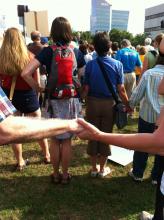
The throngs of demonstrators who flock to the grassy knoll outside the North Carolina Statehouse each Monday know the drill.
They listen to a fiery speech denouncing the Republican majority’s legislative actions. They sing freedom songs and chant civil rights slogans. Then they march two by two into the legislative building to be handcuffed by police and arrested for failing to obey orders to disperse.
Leading them in this weekly rite of nonviolent civil disobedience is the Rev. William J. Barber II, president of the state’s NAACP chapter. Since assuming the state presidency eight years ago, he has waged numerous battles challenging local and state governments to extend educational opportunities, broaden the voting base, provide health care, and more generally lift up the poor.

Religious leaders from the NAACP met with evangelist Franklin Graham Tuesday (March 20), less than a month after they accused him of "bearing false witness" when he questioned President Obama's Christian faith.
"All parties were in agreement that it is essential to our society and our faith that we refrain from demonizing Christians and people of other faiths when they do not agree with us," said the Rev. Nelson B. Rivers III, a NAACP vice president, in a statement released after the meeting at the Billy Graham Library in Charlotte, N.C.
"We look forward to continued discussions with Rev. Graham."
On Feb. 28, prominent clergy from the NAACP accused Graham of "bearing false witness" and inciting racial discord when he said he couldn't say whether Obama is a Christian and added that "under Islamic law, the Muslim world sees Barack Obama as a Muslim."

Huffington Post: An Interview with United States 39th President Jimmy Carter, Religion News Service: Romney’s Evangelical Problem Starts with Theology, Huffington Post: On Scripture: Mark 1:4-11: Does Baptism Make for Better Presidents?, Huffington Post: Obama Fails on Minimum Wage Pledge, Slate: NAACP Condemns Rick Santorum’s “Black People” Gaffe, TPM: Defense Secretary Panetta: Defense Cuts Come With ‘Additional But Acceptable Risk’, CNN: Controversial Catholic program for gays begins in Connecticut, CNN: What happens when candidates called by God drop out?
The U.S. Supreme Court is set to begin hearing oral arguments this week in one of the most important church-state cases in decades. In Hosanna-Tabor Church v. Equal Employment Opportunity Commission, the court will consider whether a Lutheran school in Michigan is subject to a federal law banning discrimination based on a disability.
